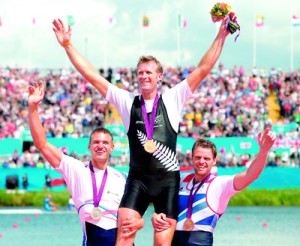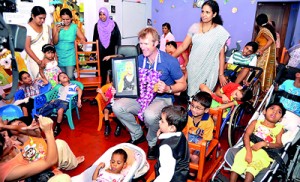Drysdale’s eye-wetting row to the pinnacle
When Mahé Drysdale pulls his beautiful Olympic gold medal out of the back pocket of his jeans, it is greeted by a happy gasp from all the journalists in the room. It’s been just over 10 weeks since New Zealand’s legendary rower stood on the winner’s podium in London and the heavy, gold medal suspended from its ribbon of royal purple is a symbol that Mahé has accomplished his life’s ambition. When he propelled the knife edge of 27 ft of single scull over the finish line a mere two seconds ahead of his closest rival, the Czech Ondøej Synek, it was the happy ending he and his fans had waited for but Mahé’s victory is made so much sweeter by the story of his last Olympic games.

Drysdale stands triumphant on the medal podium in London. Reuters.
Literally sick to the gut with a virulent stomach bug, Mahé didn’t really have a chance in Beijing in 2008, but he rowed anyway. The designated flag bearer for the New Zealand Olympic team, he led them into the Birds Nest stadium but had ended up spending the night before the race on an IV drip. He lost 4 kg overnight and was dehydrated going into the finals; but Mahé’s stubborn persistence got him into the boat and even into lead position in the race before he lost it to Olaf Tufte and Synek.
Drained to the bone, he had already thrown up before he was rushed directly from the winner’s podium to the hospital. For the five time World Champion in the Men’s Single Sculls category, that bronze medal may have felt like a loss, but watching Mahé push himself so very hard and then lose so gracefully won him the unstinting admiration of his countrymen and a legion of new fans – some of whom have been eagerly awaiting his arrival in Sri Lanka. Here he will meet with young oarsmen and oarswomen at the invitation of t-sips, a company that has sponsored and supported young rowers at a school level.
The last time Mahé Drysdale visited this island, he was in his mother’s womb. (He is named for where his parents went next – Mahé, the biggest island in the Seychelles.) Now 33, Mahé is already an old man in the sport he loves. Though he has been affectionately dubbed ‘grandpa’ by the New Zealand rowing team, Mahé is an athlete in his prime. At 6’7, he towers above everyone else in the room. Barrel chested and 100 kg when in peak condition, Mahé consumes a staggering 7,000 calories a day. Later, sitting across from us, sipping tea and helping himself to a plate of short eats, he confesses that he’s put on 10 kg since the race and is now feeling a little fat, blissfully, he has no clear plans to exercise.
For the last decade, Mahé has measured his life in four year increments: at 22, it was Athens, 2004, then it was Beijing, 2008 and finally, London, 2012 – the games that might very well be his last. (All around, the Kiwi rowing team shone in London – adding 3 gold and 2 bronze medals to the N.Z’s total tally of 13). Punctuating these years, have been serious injuries that have threated Mahé’s entire career as a pro-athlete. Mahé solution has been to train till he “110%” and “bulletproof” – able to function despite injury.
His first setback took the form of water skier who drove right into him in 2004. Landed in hospital with two fractured vertebrae, he would still manage to get back and win his first World Championship that very year. Another disc related injury and a diagnosis of osteo-arthritis in the facet joint in his back can still make rowing painful. To compensate, he’s had to change the way he trains, climbing out of the boat and onto a bicycle for half the time. Ironically, it was while he was peddling away that he got hit by a car this year, just 6 weeks before the London Olympics. He was forced to rest a busted shoulder for 3 of those weeks.
“Sport is completely is brutal, you have to go out there and you have to perform on a given day at a given time. I know four years in advance that I have to perform. If you’re not a 100%, well too bad, you just have to go out anyway.” His mother Robin (manager of his fan club) has said he inherited this teeth gritting determination from his grandfather, who could be just as “pigheaded” as her son is. (Her late father, former Tauranga and Mt Maunganui mayor Sir Bob Owens, was a hero to his grandson.).
This single minded determination is what has allowed Mahé to be such a success in single scull rowing. Though he was part of the Elite Coxless Four for the Athens Olympics, placing fifth even after all the hard work made him consider going it alone. Though he’s never had cause to regret his decision, rowing a single scull is a lonely business. It’s why Mahé feels so close to the men who are his greatest rivals. “I’ve literally raced them hundreds of times,” he says of competitors like Synek and Tofte who perhaps know better than anyone else what he’s going through. “It’s sort of strange but we are very good friends. I train with them, I go and stay with them but then on the water its pure rivalry. In some ways that competitiveness with someone who is your friend is even fiercer, because you really don’t want to be beaten when you know you’re going to be seeing them around.”
The last 11 weeks of travel have taken him to the U.S and Argentina – the longest break he’s had since he began rowing in 2001. He’s

Drysdale shares a moment with the children at the Cerebral Palsy Foundation in Wattala. Pic by Nilan Maligaspe
put off making the decision of whether or not to go to Rio in 2016 till the end of this year. In the meantime, he’s simply enjoying the flush of victory. “I’ve barely had a moment without a smile on my face – I’m just so happy with what I’ve achieved,” he says, remembering that after the race, he could hardly talk, he was crying so hard and that it soon turned into an elation that hasn’t worn off yet.
He knows however, that there are key decisions yet to be made. Though he studied to be a chartered accountant, he can’t imagine being cooped up in an office all day – he much prefers life on the 16 acre property he shares with his partner and New Zealand rower Juliette Haigh, flatmate/farm manager Gary, golden retriever Oslo, flat coat retriever Dasha, spider pig, Nibbles the lamb, eight cows, four chickens and sometimes two Burmese cats, Sahara and Tassie, who generously divide their time between him and Robin. After five years with Juliette, he’s also ready to start thinking about a family and responsibilities outside rowing.
For now, he’s particularly interested in the young people t-sips will introduce to him (this includes the children at the Cerebral Palsy Foundation in Wattala). He wants to tell them that it’s not physique (“the top couple of inches are in your head”) or even talent (“rowing isn’t a sport that requires natural talent…it can be taught”) that will win you the gold but hard work, determination and a dream. Wind or rain, that’s what’s driven him to practice. “For me, I had that dream and that’s what got me out of bed,” says Mahé. When he shows his gold medal to his young protégés, he’s hoping they’ll find their own too.
Follow @timesonlinelk
comments powered by Disqus



























